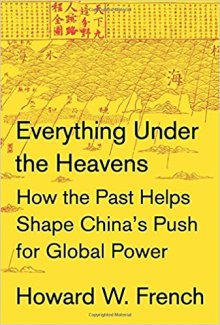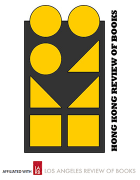Mike Cormack discusses the future of China and a variety of ways to approach it, considering the myths at the foundation of the various world powers.
Howard W. French, Everything Under The Heavens: How the Past Helps Shape China’s Push for Global Power (Knopf, 2017), 352pp.
China’s relations with its immediate neighbors, previously relatively stable, have begun to adapt and shift as rapidly as China’s economy continues to grow. The oft-cited maxim of Deng Xiaoping – “keep a low profile and achieve something” (taoguang yanghui, yousuo zuowei) – which kept the peace between the short war with Vietnam in 1979 and the modern day – is coming under huge strain as China’s economic rise is now accompanied by hugely increased claims, bellicosity and assertions of what might be called manifest destiny. Naturally this has garnered intense scholarly and journalistic attention. Tom Miller’s China’s Asian Dream, for example, was a terrific combination of data and pavement-pounding local investigation, with discussions between academics, market traders and officials from Laos to India.
Howard French’s Everything Under The Heavens, however, takes a very different tack. By examining the history of China’s neighborly relations, French aims to illuminate their present and their future. This approach is both useful and relevant, as China’s long history of regional dominance casts a long shadow, and because China’s governing elite is deeply aware of their historical mission and responsibility – even if, as so often, that narrative is less rooted in genuine history and more about seeking justifications for present strategies.

Two overriding themes arise, from the Communist party’s choice of narrative and from China’s sense of place in the world. These are “the century of humiliation” and tian xia, the abiding belief that the Chinese emperor (or ruler) governs all “under heaven” – meaning that China is the locus of the world, its centrality the organizing principle of its diplomatic worldview whereby all other nations are peripheral and, thus, inferior. This codification of the world persists across the dynasties, as China’s borders fluctuate and as rival powers come and go. Perhaps surprisingly, French shows how tian xia is replicated across Eastern Asia, as other nations (particularly Vietnam) see it as the natural method of diplomacy for their own subordinates (or who they aim to be their subordinates). Tian xia is not, of course, a uniquely Chinese phenomenon. Every leading power considers itself the centre of the civilized word, from the Romans naming the Mediterranean after Medi Terra, the middle of the land, and Britain locating the central date line in London.
Tian xia is of course a foundational myth, as much as the revolutionary beginning of the US or the USSR’s claim to emancipate the workers. Its persistence despite China’s collapse into chaos and penury during the twentieth century is remarkable. Most countries come to accept a humbler place in the world order during straitened times; one does not hear so many hankerings for re-ordering of global power from Austria, Mexico or Poland. (The UK is a special case, as a former hegemonic nation whose self-regard has been propped up by its close relation to its successor, the United States, and the continuity of the Commonwealth). Their self-conception is de-centered. But post-revolutionary China, which maintained and even expanded its territory (incorporating/annexing, depending on one’s outlook, Tibet in 1950), did not suffer the ignominy of territorial losses and neighborly encroachments. Its sense of cultural and historical continuity remained. It remained vast, hugely populated and proud. The revolutionary government thus chose to describe China’s period of weakness as its “century of humiliation”. This designation is deliberate. It ascribes Chinese weakness to external forces, rather than internal failings, and allows tian xia to remain unimpeded.
How this does this all affect China’s relations with its neighbors? Not surprisingly, China is proud, aloof, and both strong and vulnerable to slights against its dignity. Japan, as an island nation, is equally singular, causing endless friction and enmity, for tian xia admits only one locus. French describes how its neighbors had to verbally kowtow to the Chinese emperor, walking a tightrope between obeisance and self-assertion. The South China Sea is, of course, in no way a discovery or development of China, with French lucidly demolishing the Chinese government’s historical claims as so much hokum. China’s claims, however, are expertly put in a historical geo-political context. Chinese leaders are exceptionally good at knowing when to settle. When China was weak, as it was in 1979, it was willing to park the South China Sea issue with Japan and Vietnam, saying it was an issue for future generations to settle. When it is strong, as it is today with a military budget growing at 10% a year, it is suddenly willing to re-open the issue. “Laying low”, as Deng Xiaoping advised, was simply recognition of relative strengths at the time; equal emphasis should be placed on “achieving something”. China has become the leading trading partner and is leading the ‘One Belt, One Road’ initiative that promises infrastructure and development from Cambodia to Kazakhstan, and it now wants to reap the rewards.
Vietnam, Japan, the Philippines, India, and other neighbors are naturally less than enthusiastic about a country so nakedly eager to reassert its dominance in the region and the world. But money talks, and as long as China keeps spending it has a biddable backyard. Whether China’s bid to reclaim its position as the center of the world will follow on from this remains to seen. In its effort to put China’s renewed claims in a historical, psychological and geopolitical context, Everything Under The Heavens is an tremendously useful contribution to our understanding of where China came from and, thus, where it is going.
Mike Cormack is an editor, reviewer and writer who mainly focuses on China, where he lived from 2007-2014. He edited the magazine “Agenda” in Beijing. He is also currently working on a novel examining growing up in northern Scotland.
Please support the HKRB and look out for more essays, interviews and reviews by following our Facebook page and Twitter account.
